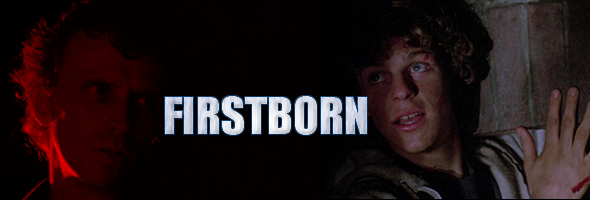

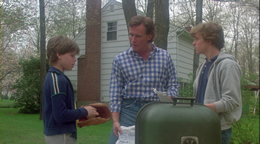
Two years after their parents split up, teenager Jake (Sleepaway Camp's Collet) and his little brother Brian (Haim, pre-The Lost Boys in his first role) are shaken to learn that their dad plans to remarry. However, their mother Wendy (Garr) rebounds in a different way by bringing home a new boyfriend, Sam (Weller, pre-RoboCop), whose security business has gone under. He has plans to start his own business, but Wendy seems blind to his multitude of character flaws -- which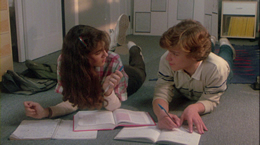 include introducing her to the world of cocaine using and selling. On top of that he starts to slap Jake around, leading to an escalation of tension that forces Jake to maneuver around Sam using any means necessary.
include introducing her to the world of cocaine using and selling. On top of that he starts to slap Jake around, leading to an escalation of tension that forces Jake to maneuver around Sam using any means necessary.
A director with more curve balls in his career than almost any other, Michael Apted rose to prominence both as a documentarian and as a feature filmmaker with titles like Coal Miner's Daughter and the underrated Gorky Park, not to mention a James Bond film (The World Is Not Enough). In 1984 he released two films, both looking at the process of growing up from very different angles: the acclaimed documentary 28 Up and the genre-bending Firstborn, which superficially looks like another of the big-studio teen films from the period. Though much of it plays like a domestic drama about a high schooler learning to man up after his family is broken apart, it also plays around in the same sandbox as a thriller made three years later, The Stepfather. Both films deal with teens and their single moms dealing with the arrival of a strange and violent man into their family unit, with violence ultimately being the only way to keep them from being destroyed. However, in a really weird touch, the wretched 2009 remake of The Stepfather actually wound up swiping far more from Firstborn than its credited source!
By any standard, Firstborn sports a pretty impressive pedigree beyond its director. The supporting cast also includes a very young Sarah Jess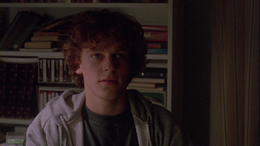 ica Parker (hot off her short-lived series Square Pegs but way before Sex and the City) as Jake's girlfriend and a flashy, eccentric turn by Robert Downey, Jr. (just before Weird Science and Tuff Turf), wearing lots of hair product as a high school pal. Future Oscar winner Colleen Atwood (Alice in Wonderland) handled costume designs, oddly enough, while the gauzy suburban cinematography comes from regular Apted l
ica Parker (hot off her short-lived series Square Pegs but way before Sex and the City) as Jake's girlfriend and a flashy, eccentric turn by Robert Downey, Jr. (just before Weird Science and Tuff Turf), wearing lots of hair product as a high school pal. Future Oscar winner Colleen Atwood (Alice in Wonderland) handled costume designs, oddly enough, while the gauzy suburban cinematography comes from regular Apted l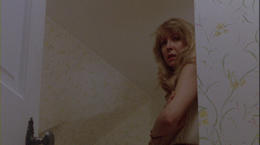 enser Ralf D. Bode, who also shot Dressed to Kill.
enser Ralf D. Bode, who also shot Dressed to Kill.
Then there's the soundtrack, a combination of synth grooves from the late Michael Small (Klute) and a smattering of '80s pop tunes like Re-Flex's "The Politics of Dancing" and Talk Talk's "It's My Life." No wonder this one used to play afternoon TV on nearly constant rotation back in the late '80s; it's the perfect combination of after school special and violent thriller, pushing the then-recent PG-13 rating about as far as it could go at the time. Weller makes for one of the more memorably slimy victims of the era, but the real impact here comes from some surprisingly sensitive work from Collet and Garr; the nonverbal moment when he comes home from dinner with his dad is especially effective and a reminder of just how solid a dramatic actress Garr could be with the right material.
For some reason Firstborn sat out the height of the DVD era entirely, but that's been rectified with this release from Olive Films. The feature-only Blu-Ray edition is an appreciable jump in quality over the foggy-looking VHS and cable versions, of course, and it's also more colorful and healthy in appearance than the pretty dreary theatrical prints, too. The opening studio logo and main title opticals look a little ragged since they're duped down an element or two to begin with (a common practice at the time), but after that it's pretty smooth sailing apart from some very minor and fleeting debris. Detail stays sharp, the film grain in scenes with lower lighting is natural and very cinematic in appearance, and the framing looks much more focused and aesthetically pleasing than the way most of its target audience originally saw it. For some reason Paramount was one of the last studios to completely switch over to Dolby Stereo in the '80s outside of its tentpole titles, so this one's still single-channel mono (DTS-HD); that said, the audio is much crisper than you'd probably expect, as both the dialogue and music have a punch sorely missing on past editions. Anyone who loves '80s movies should find plenty to enjoy here.
![]()